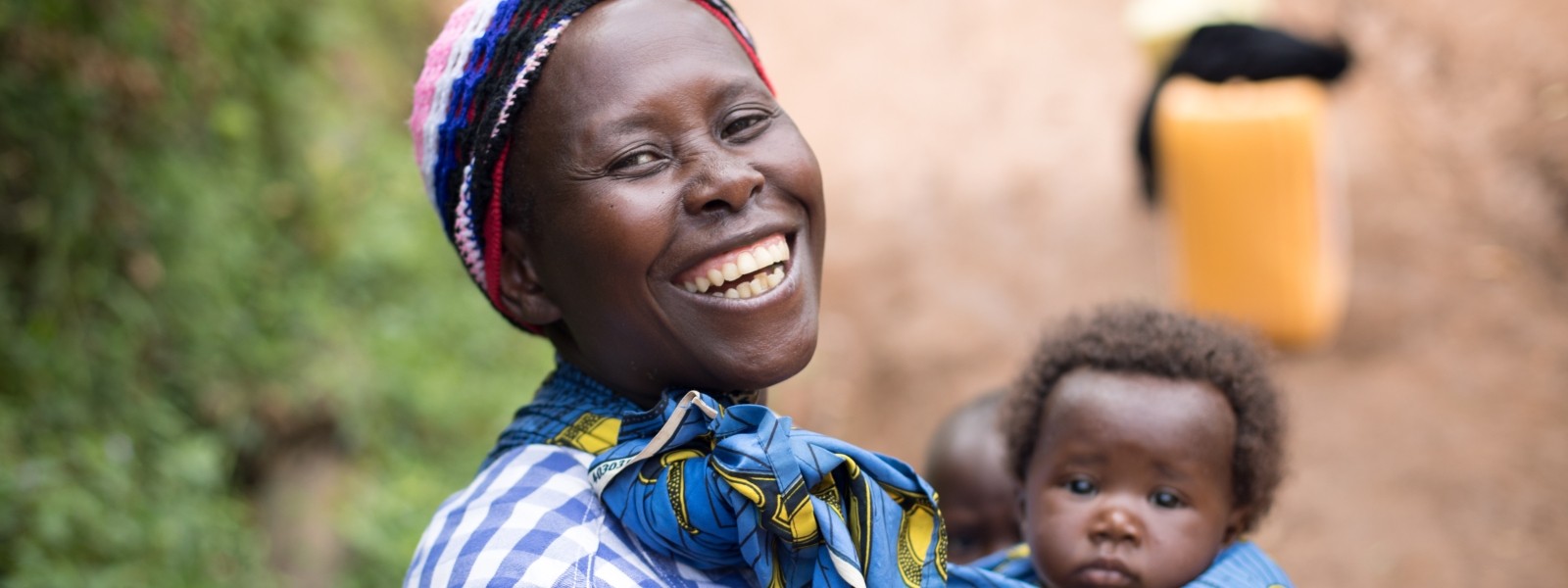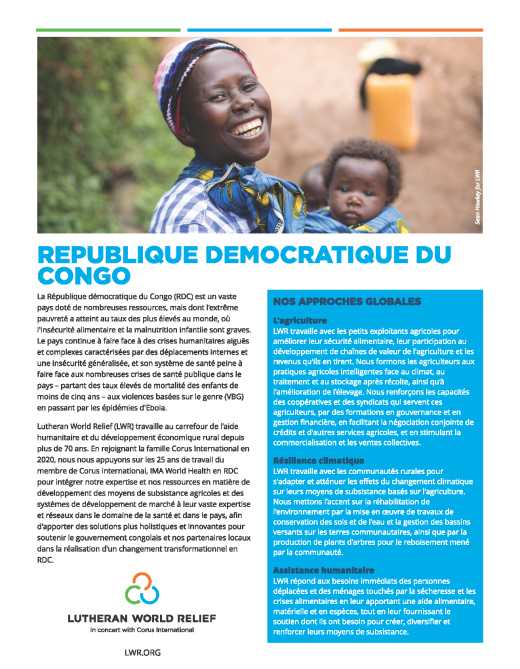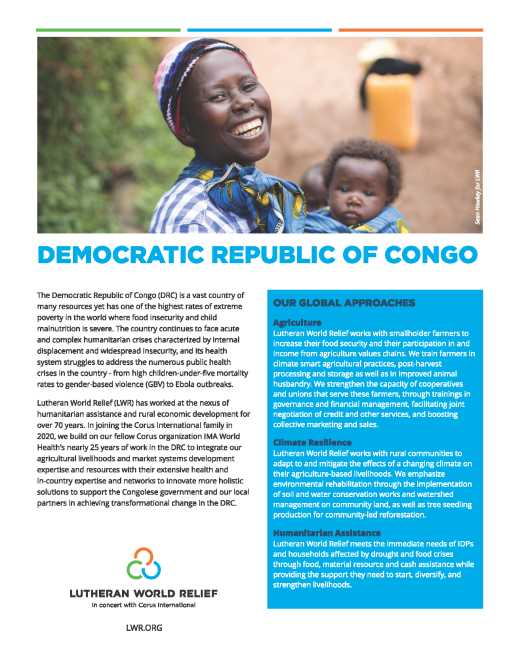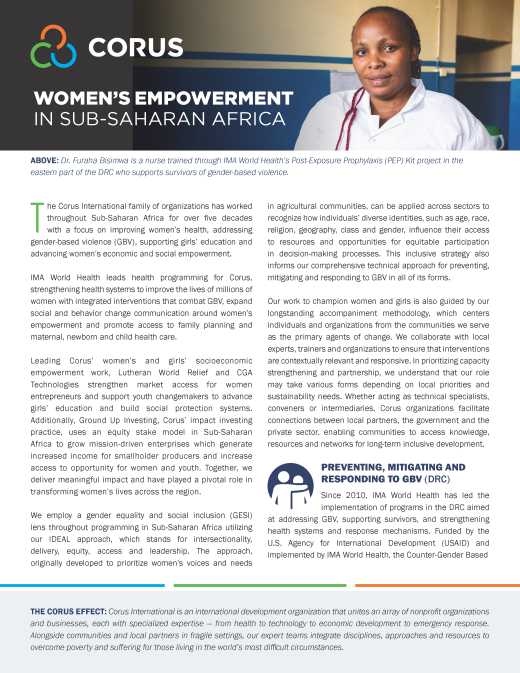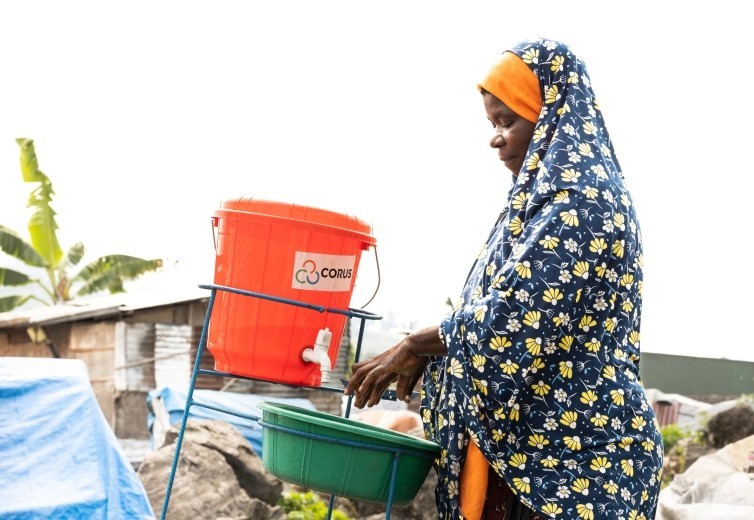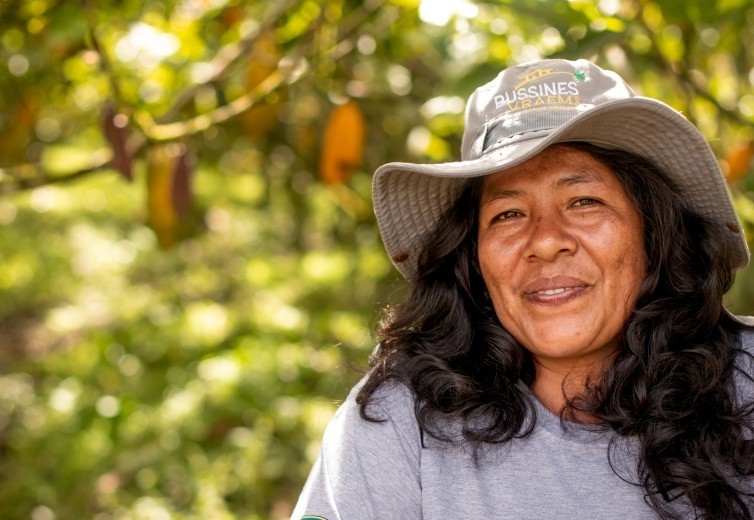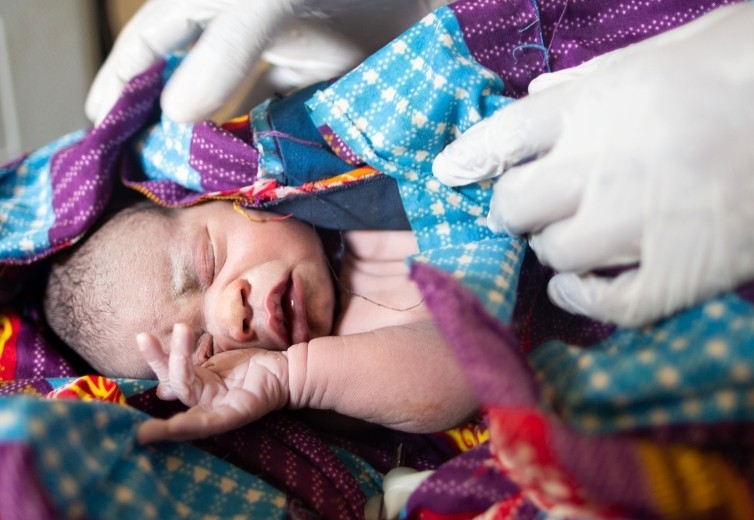The Democratic Republic of Congo (DRC) is a vast country of many resources yet has one of the highest rates of extreme poverty in the world where food insecurity and child malnutrition is severe. The country continues to face acute and complex humanitarian crises characterized by internal displacement and widespread insecurity, and its health system struggles to address the numerous public health crises in the country - from high children-under-five mortality rates to gender-based violence (GBV) to Ebola outbreaks.
Lutheran World Relief (LWR) has worked at the nexus of humanitarian assistance and rural economic development for over 70 years. In joining the Corus International family in 2020, we build on our fellow Corus organization IMA World Health's nearly 25 years of work in the DRC to integrate our agricultural livelihoods and market systems development expertise and resources with their extensive health and in-country expertise and networks to innovate more holistic solutions to support the Congolese government and our local partners in achieving transformational change in the DRC.
Agriculture
Lutheran World Relief works with smallholder farmers to increase their food security and their participation in and income from agriculture values chains. We train farmers in climate smart agricultural practices, post-harvest processing and storage as well as in improved animal husbandry. We strengthen the capacity of cooperatives and unions that serve these farmers, through trainings in governance and financial management, facilitating joint negotiation of credit and other services, and boosting collective marketing and sales.
Ground Up Investing
As part of the Corus International family, Lutheran World Relief collaborates frequently with Corus' innovative venture impact investing arm, Ground Up Investing (GUI), to offer a unique solution to rural poverty—patient capital. GUI invests capital with no immediate expectation of profiting in small agri-food and service provider businesses with the potential to increase financial opportunities for people in the community, strengthen the climate resilience of agricultural landscapes, and transform food systems. GUI frequently takes equity positions in early-stage companies while following with working capital facilities, providing agricultural and business management/marketing assistance when needed. This flexibility in capital provision and support is key for small and growing businesses in developing markets where few financing options exist. GUI often serves as the bridge to social lenders or traditional financiers. Some of GUI's investments include Latitude Trading Company, a cacao exporter and bean-to-bar chocolate maker that sources from 3,500 farmers, Biochar Life, an impact venture that incentivizes African farmers to convert crop waste into carbon-sequestering biochar, and Mountain Harvest, which exports specialty coffee sourced from over 2,000 farmers, in Uganda.
Climate Resilience
Lutheran World Relief works with rural communities to adapt to and mitigate the effects of a changing climate on their agriculture-based livelihoods. We emphasize environmental rehabilitation through the implementation of soil and water conservation works and watershed management on community land, as well as tree seedling production for community-led reforestation.
Humanitarian Assistance
Lutheran World Relief meets the immediate needs of IDPs and households affected by drought and food crises through food, material resource and cash assistance while providing the support they need to start, diversify, and strengthen livelihoods.
Global Project Examples
The SESAME Project increased the quality and volume of sesame exports in the regions of Boucle du Mouhoun, Est, Cascade and Hauts Bassins in Burkina Faso. In collaboration with local partners Afrique Verte and Nitidae, LWR trained smallholder farmers in the best climate-smart practices in sesame production, post-harvest handling and storage.
Through the project, farmers also increased their business skills, access to financial services, particularly credit, and connection with buyers. Lutheran World Relief employed a Producer Enterprise Agent (PEA) model, in which PEAs provided production, post-harvest handling and processing training to cooperative and union members. Around 72,712 individuals now use new techniques and technologies on 180,668 hectares, resulting in increased sesame yields up to 350 kg/ha (from 235 kg/ha women; 241 kg/ha men) on average land sizes of 1.6 ha/person. Lutheran World Relief also hosted pre-marketing workshops, bringing together 77 sesame industry representatives to ensure the quality of sesame sold internationally. Through this arrangement, 54 pre-season contracts (total of 25,000 metric tons; valued at $25 million) were signed.
LWR leads cocoa programming for the U.S. Department of Agriculture’s Food for Progress MOCCA project, helping farmers sell more at better prices, improving farmer production and enhancing sector coordination to drive competitiveness and growth. Through MOCCA, LWR partners with the private sector across six countries in Latin America to not only invest in improving cocoa quality and yields, but also in the systems that make those improvements possible for the future, such as higher prices, good genetic material for planting, and more direct, feasible and profitable supply chains for smallholder farmers. Cocoa producers also utilize LWR’s Cacao Móvil (Mobile Cocoa), a smartphone application that provides farmers with access to a comprehensive guide to cocoa cultivation, covering subjects from planting and pruning, to grafting and treating plant diseases. LWR is developing a regional platform for knowledge transfer to strengthen the cocoa value chain while disseminating research across Latin America.
This project helped 14,548 farmers in Burkina Faso, Mali and Niger become more resilient to climate-related shocks through integrated approaches to improve agricultural and animal production, increase income generation and strengthen community-based organizations to deliver quality and trusted services to small-scale farmers. The project diversified, increased and protected household agricultural production, increased sales margins and incomes from agricultural surpluses, and enabled strong and accountable community-based organizations (CBOs) to provide agricultural advisory services and harness their social capital to support community resilience. CORE II ultimately benefited 147,306 people. Through the course of the project, 85.5% of targeted households had their livestock restocked, 91.5% had an increase in cowpea yields, 60.6% had an increase in sorghum yields, and 75.4% developed additional revenue streams. Additionally, 6,624 women organized in village savings groups. CBOs saw a 139% increase in operating capital, and 79.8% of their members had a good impression of CBO operations.
Funded by the U.S. Department of Agriculture’s Food for Progress Program, TRACE is a five-year project that improves Nigeria’s cocoa productivity through climate smart agriculture and expand its traceability for stronger marketability. In partnership with the federal and state governments of Nigeria, the International Institute of Tropical Agriculture (IITA), the Cocoa Research Institute of Nigeria (CRIN), Ecometrica, and C-Lever.org. Lutheran World Relief implements TRACE in Nigeria's cocoa-producing states of Abia, Ikwa Ibom, Cross River, Ekiti, Ondo, and Osun States. By the end of the project, over 51,000 smallholder farmers will be trained, resulting in a doubling of cocoa productivity and establishing a comprehensive (farm to export) traceability system that meets global standards. More than 68,400 farmers will gain access to markets, and over 366,000 hectares of farmland will be under improved climate risk reduction and/or natural resource management practices.
Funded by the U.S. Department of Agriculture’s Food for Progress Program, PROFIT is a five-year project in the Plateaux, Kara and Savanes regions of Togo that will increase agricultural productivity for hot peppers, cassava, and okra by strengthening the capacity of farmers, producer organizations (POs), processors and other private entities, while improving food security and the use of climate-smart agricultural practices. The project will also expand trade of these crops by increasing their quality to meet international standards and connecting farmers and POs with local and international buyers. Lutheran World Relief implements the project in collaboration with CRS, OADEL, RAFIA, GRED, and ODIAE.
In the Democratic Republic of Congo (DRC), Lutheran World Relief's fellow Corus organization IMA World Health's Access to Primary Healthcare (ASSP) project (2012-2019) and its follow-on Support to the Health System in the DRC (ASSR) project (2019-2021) reached over 7.5 million children and pregnant women including over 1.4 million nutrition intervention participants. IMA and its partners trained over 10,700 community health workers and nurses in malnutrition screening, nutrition education, and/or home gardening. Service utilization rates across 1,500 health facilities increased from 34% to 62% in six years through innovations such as reinforcement of community management of acute malnutrition (CMAM) with community relays (RECOs) and Infant and Young Child Feeding (ANJE) support groups which increased screening numbers and family support. Multi-sector malnutrition management initiatives promoted easily grown, nutrient-dense perennials such as moringa and chaya and complex carbohydrates like cassava through nurseries and demonstration gardens at health clinics. Both projects were generously funded by the U.K.'s Department for International Development (now FCDO). Learn more.
The Multisectoral Nutrition Project (Projet Multisectoriel de Nutrition et de Santé - PMNS) is strengthening nutrition outcomes for at-risk pregnant women and malnourished children in Kasai Province, DRC. With funding from the World Bank and the DRC's Ministry of Public Health, Lutheran World Relief's fellow Corus organization IMA World Health and its consortium of partners are providing nutrition services at the community level, strengthening prenatal consultations as well as revitalized preschool consultations including improved routine micronutrient supplementation, and supervising systemic intensive screening and structured home visits by community health relays. The DRC's Ministry of Health and National Nutrition Program (PRONANUT) are included in all training, monitoring and evaluation, and supervision activities to encourage synergy. Within the project, IMA World Health employs its experience, as well as that of Lutheran World Relief, supporting village savings and loan associations (VSLAs), improved cook stoves, and entrepreneurship and leadership opportunities that promote home gardening and income-generating activities for women. IMA World Health's consortium of partners for the PMNS project includes the Adventist Development and Relief Agency (ADRA), SANRU, Programme for the Development of Eastern Kasai (PRODEK), and the Congo Leadership Initiative (CLI).
To date, the project has reached 408,068 children aged 0-59 months with preschool consultations and screened 26,473 children for acute malnutrition. In the first quarter of the project (August–Sept 2023), 257,125 children aged 0-23 months received a preschool consultation, 26,473 children 6-59 months were actively screened for acute malnutrition, 787,624 home visits were made by community relays to follow up with families of children screened for/diagnosed with malnutrition, and 2,986 cooking demonstration sessions were held in communities.
Through LWR’s Investing in New Ventures of Entrepreneurial Students in Tanzania (INVEST) Project, we partnered with the Ministry of Agriculture’s technical agriculture institutes to strengthen course curriculums to include market-ready skills and training and to expose students to real-world careers in agriculture through paid internships. The revised curriculum, approved and signed by the Tanzanian Ministry of Agriculture, is now being implemented in 36 technical agricultural institutes, reaching over 25,000 students. LWR partnered with private companies and secured internships for more than 280 students. In recognition of the difficulty youth often have in gaining critical investment capital for their entrepreneurial ideas, INVEST also included an annual start-up challenge fund for students. LWR provided financial literacy and grants to support youth entrepreneurs, businesses and commercial entities to expand their business, many in agri-food processing, beyond school. In total, 312 students received start-up capital to launch a business and 60% of their enterprises are already profitable. LWR is working to create a broader view of agricultural careers through programming and investment in agriculture education for both on- and off-farm occupations.


